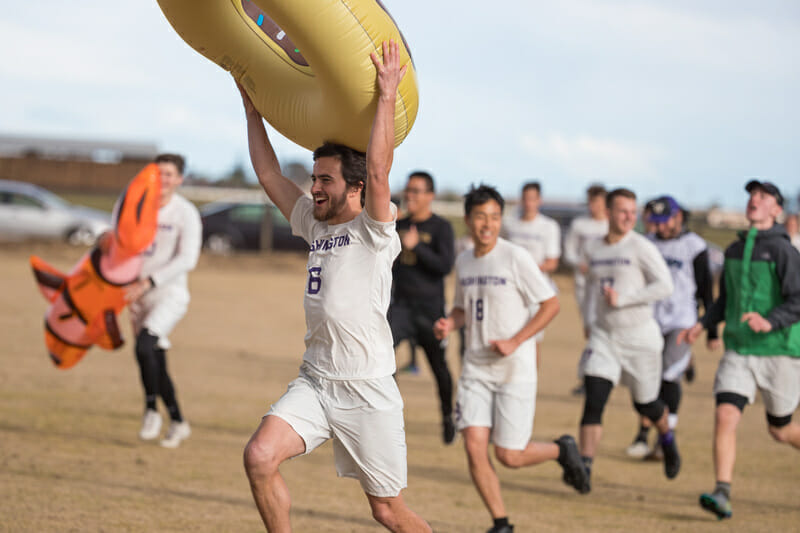Part I of a series about team narratives explores how teams focused on fun might be hurting themselves.
January 26, 2024 by Tiina Booth in Opinion with 0 comments

This article is presented by the National Ultimate Training Camp! Learn the game and build relationships that last a lifetime with players from all over the country and beyond. More info at www.NUTC.net
There is a time and place for telling and sharing stories about your team. Long car rides, airport delays, and crappy hotel breakfasts all provide great venues for sharing tales of past team adventures.
That’s not what I am talking about here. The stories that damage teams are the ones from the past that are carried into the present and future. The ones that are based on random events that define how your team competes. We have all heard some version of these before:
- “We never warm up until the second game on Saturday.”
- “We always struggle coming out of a bye.”
- “We can never beat this team.”
- “We will always beat this team.”
On the surface, these statements may seem rather benign. However, how your teammates think about themselves and how they approach every game is often influenced negatively by these stories. In my experience, from coaching, teaching, watching games and talking to players, the three most common destructive narratives are:
- We just wanna have fun
- We are owed success
- We will win if everything is perfect
In the next few weeks, I will take a deep look into how these stories may materialize on your team and how you can change their trajectory.
Narrative #1: We are a Team That Just Wants to Have Fun
How it Manifests
The main problem with this narrative is that it means many different things to different people. Some players think it means that attendance is optional. Or it’s fine to skip team workouts. Or bailing on a tournament at the last moment is not a big deal. Fun morphs into a lack of accountability.
For others it means developing a team persona that exudes fun and entertainment at all times, at tournaments and online. This may show up as sideline props or end zone celebrations or traditions from past teams. These activities are mostly harmless and can even boost team bonding. They only become problematic when they indicate a deeper imbalance on the team.
What does fun look like when the first pull goes up? While an overall team lightness is crucial to competitive success,1 a team that prioritizes fun often means that anything goes. And we all know what anything goes looks like. Teammates feel entitled to ignore any systems and throw it away from every corner of the field. A player will stop covering their person going deep because they don’t want to be shown up. It’s the rare team that finds fun after losing 15-3.
How it is Damaging
A team that buys into this narrative is buying into chaos. And chaos is exhausting. Players may see the lack of commitment and focus as the defining characteristic of the team. Practices will have low numbers and even finding enough players for weekend tournaments is a last-minute ordeal. How many times have we seen formats change on Friday night because a team has dropped on Friday morning? Sometimes teams disintegrate by the time the Series rolls around. The players who stick around are definitely not having fun.
Some players also prioritize fun because they may be scared to commit 100% to actually competing. This is a far more serious issue and can sabotage your team at crucial points in the Series. Putting extra energy into fun and choosing to underprepare is a way to shield yourself from the disappointment of losing. If you didn’t really try, did you really lose?
Authentic fun can be intrinsic to a team’s success but fun that is distracting and allows for wide interpretation does not benefit anyone.
How to Fix It
The problem with an unfocused team is that committing to pageantry can take away from player development. There is a finite amount of time in a season. One college player told me recently that they only have 40 practices before Regionals. Your priority as a team is to work toward developing laser focus. If you need to drill your reset at every practice, as well as your endzone set, do you really have time to be distracted? The reasons for idolizing the concept of fun are so varied, and have so many fierce advocates, that having a team-wide agreement on how to present your team identity must be done intentionally. Do not assume that every player supports how your current team is presented and perceived. I assure you they do not.
It also helps to incorporate fun into an actual practice, the kind of fun that develops a team and maintains a light and supportive atmosphere. Fun and an intentional focus on improvement do not need to be mutually exclusive. Mini-competitions, focused drills, and energetic scrimmaging are valuable tools for a team that wants to compete at a higher level. Fun should be the dessert at the end of a very satisfying meal. It enhances but does not replace the main course.
Final Thoughts
Be intentional about developing your team persona. Take a good hard look at what your team does and why. If competitive success is your team’s goal, study how to reach peak performance at the right time. And find the most efficient and direct way to get there together. That can be the real fun of being part of a team.
A light and focused atmosphere is essential to achieving peak performance. Sure, Mamabird won College Nationals in 2014 and they tossed a football around. My guess is that they also spent some time training and prepping for competition. ↩